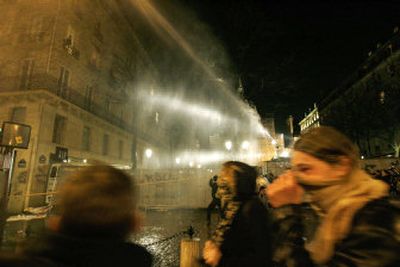Jobs plan sparks French protests

PARIS – Police loosed water cannons and tear gas on rioting students and activists rampaged through a McDonald’s and attacked store fronts in the capital Saturday as demonstrations against a plan to relax job protections spread in a widening arc across France.
The protests, which drew 500,000 people in some 160 cities across the country, were the biggest show yet of escalating anger that is testing the strength of the conservative government before elections next year.
At the close of a march in Paris that drew a crowd of tens of thousands, seven officers and 17 protesters were injured during two melees, at the Place de la Nation in eastern Paris and the Sorbonne University. Police said they arrested 156 people in the French capital.
Four cars were set afire, police said, and a McDonald’s restaurant was attacked along with store fronts at the close of the march.
Tensions escalated later Saturday as about 500 youths moved on to the Sorbonne, trying to break through tall metal blockades erected after police stormed the Paris landmark a week ago to dislodge occupying students. The university has become a symbol of the protest.
Police turned water cannons on the protesters at the Sorbonne and were seen throwing youths to the ground, hitting them and dragging them into vans.
“Liberate the Sorbonne!” some protesters shouted. “Police everywhere, justice nowhere.”
In an apparent effort to set fire to a police van serving as a blockade, protesters instead torched the entrance of a nearby Gap store, apparently by accident, engulfing the small porch in flames.
With commerce snarled in some cities, people asked whether Prime Minister Dominique de Villepin would stand firm on implementing the change that he says is needed to encourage hiring. The usually outspoken leader was silent Saturday.
Protest organizers urged President Jacques Chirac on Saturday to prevent the law from taking effect as expected in April.
The group issued an ultimatum, saying it expects an answer by Monday, when leaders will decide whether to continue protests that have paralyzed at least 16 universities and dominated political discourse for weeks.
“We give them two days to see if they understand the message we’ve sent,” said Rene Jouan of CFDT, France’s largest union.
The law would allow businesses to fire young workers in the first two years on a job without giving a reason, removing them from protections that restrict layoffs of regular employees.
Companies are often reluctant to add employees because it is hard to let them go if business conditions worsen. Students see a subtext in the new law: make it easier to hire and fire to help France compete in a globalizing world economy.
Youth joblessness stands at 23 percent nationwide, and 50 percent among impoverished young people. The lack of work was blamed in part for the riots that shook France’s depressed suburbs during the fall.
Protests on Saturday reached every corner of France – most of them largely peaceful – with organizers citing 160 marches from the small provincial town of Rochefort in the southwest to the major city of Lyon in the southeast.
The Paris protest march was the biggest, attracting some 80,000 people, according to police. Organizers put the number at 300,000.